Getting an invitation that seems like a pity invite can be quite tricky. You want to reply in a courteous way without sounding rude. These situations can be tough because they stir up mixed emotions.
You might appreciate the gesture behind the invite, but at the same time, feel a bit uneasy or even hurt by the pity element.
Whether the invitation comes from a sense of duty or genuine care, it’s important to handle the situation with kindness and respect.
Recognizing the intent behind the invitation can help shape your response. Sometimes, people send pity invites because they truly want to include you but aren’t sure how to do it without it feeling awkward.
Other times, they might just want to make sure you don’t feel left out. Understanding these reasons can help you approach the situation with compassion and an open heart.
In this article, I will explore 20 different ways to respond to a pity invite, providing you with a variety of options.
Each response is designed to help you handle the situation while staying true to yourself and preserving the relationship. It’s all about striking a balance between acknowledging the invite and maintaining your dignity.
A crucial factor to consider is your relationship with the person who extended the invite. If you’re close to them, you might feel more at ease addressing the situation head-on.
Conversely, if it’s someone you don’t know well, a more subtle response could be more fitting. The aim is to reply in a way that keeps the relationship intact and avoids any unnecessary tension.
Every response is crafted to help you navigate your situation while staying true to yourself and maintaining the relationship. By reflecting on these suggestions, you can discover a reply that aligns with your values and the details of your circumstances.
It’s crucial to keep in mind that there isn’t a universal solution; the ideal response will vary based on your individual situation and the nature of your relationship with the person inviting you.
You might consider graciously accepting the invitation, showing appreciation for the gesture, even if it feels a bit awkward.
Alternatively, you could politely decline, offering a short explanation that respects both your feelings and the inviter’s intentions. Sometimes, suggesting a different plan that feels more genuine to you can be a great compromise.
Your comfort level is also an important factor. If saying yes to the invitation makes you feel uncomfortable or resentful, it’s perfectly fine to decline. The key is to do so in a respectful and considerate way.
On the flip side, if you feel at ease attending and view it as an opportunity to strengthen your relationship, then accepting might be the best option.
Now, let’s explore my personal list of 20 ways to respond to a pity invite. These responses provide a range of choices, from gracious acceptance to thoughtful decline.
By considering these various approaches, you can pick the one that aligns best with your feelings and the context.
Remember, the goal is to handle the situation with kindness and respect, ensuring that both you and the inviter feel valued and understood.
What Are My Personal 20 Ways To Respond To A Pity Invite?

You can handle a pity invite in many different ways. Here are 20 possible approaches:
Say thanks for the invite, politely say no, suggest a different plan, explain that you already have plans, appreciate that they thought of you, honestly share how you feel about the situation,
Suggest rescheduling, acknowledge that you know they meant well, give a short reason for declining, suggest a different get-together, let them know when you’re available for future plans,
Offer support in a different way, suggest a phone call or virtual hangout, stress how important the friendship is, suggest doing something as a group, explain your personal limits,
Propose a different place to meet, express the need for some alone time, suggest another date, and be open to future invites. You can adapt these responses depending on the specific situation and your relationship with the person who invited you.
You might also enjoy: Top 30 Gambling Phrases and Idioms In 2023
1. Express Gratitude: Thanking the person for the invitation
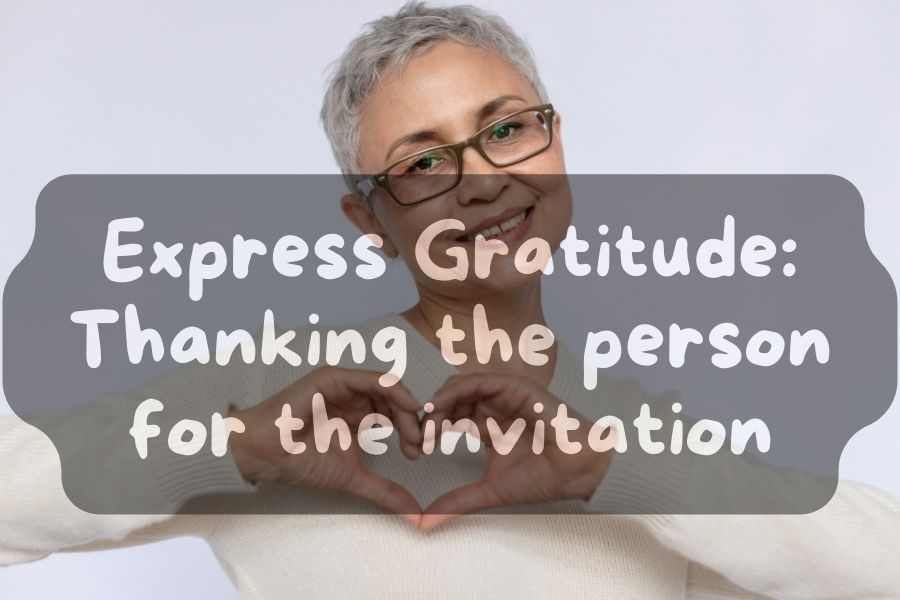
When you get invited to something out of pity, it’s important to start by genuinely thanking the person.
Thank them for thinking of you even though they didn’t have to. By doing this, you show that you appreciate their kindness and that you value their effort.
Just a simple and sincere thank you can make a big difference in keeping things positive and respectful.
You can show your appreciation by saying something like, “Thank you so much for inviting me to [event/occasion].
I really appreciate that you included me.” By being grateful, you not only show that you’re thankful for the invitation, but you also show respect for the person who invited you.
It shows that you value their friendship and the effort they made to reach out to you.
Remember to make your response personal depending on how you know the person and what the event is.
If you add a personal touch, like mentioning something you like about their event planning skills or how thoughtful the invitation was, it will make your gratitude even stronger.
Basically, showing gratitude is an easy but effective way to respond to a pity invite.
It sets a positive tone for the conversation and shows that you appreciate the person’s consideration.
You might also enjoy: Top 30 Words That End With “Ful”
2. Polite Decline: Politely declining the invitation

When you get an invitation that you don’t want to accept, it’s important to be polite and respectful in your response.
Thank the person for inviting you and let them know that you appreciate the thought behind it. Then, politely explain why you can’t attend.
It could be because you have something else scheduled, you already made plans, or you have personal reasons.
Be honest, but try not to give too many details or make excuses.
To wrap it up, say sorry for not being able to make it and send your good vibes for the event or get-together.
Also, if it’s cool, give some ideas on how to catch up or show that you’re down for future invites.
Just remember, the important thing is to politely decline but still show gratitude for the invite and keep the relationship going with the person who invited you.
3. Suggest an Alternative: Proposing an alternative plan or activity

When someone invites you out of pity, it’s a good idea to suggest doing something else that still shows you want to spend time with them.
By suggesting a different activity, you can change the focus to something that both of you will enjoy or find more convenient.
For example, if they invited you to watch a movie, you could suggest going for a hike or trying a new restaurant instead.
It’s important to think about what the person who invited you likes and tailor your suggestion to their interests.
This shows that you appreciate their company and are willing to make an effort to find something you’ll both like.
Also, be open to their ideas and willing to compromise if they have something specific in mind.
Remember, the goal is to find a solution that allows both of you to have a fun and enjoyable time together.
By suggesting a different plan, you can turn a pity invite into a chance for a better and more meaningful experience.
You might also enjoy: Top 20 Awesome Party Expressions + Examples
4. Express Prior Commitments: Explaining prior commitments that prevent acceptance

When you get invited to something you’re not really excited about, just be honest and upfront about any other stuff you’ve already agreed to do that might stop you from going.
You can explain what you’re already committed to and say how sorry you are that you can’t make it, but still be polite about it.
Start off by saying thanks for the invite and then politely mention the other things you have going on that clash with the event.
Keep your explanation short and simple; don’t go into unnecessary details.
That way, the person who invited you will understand that it’s not their fault, it’s just that you already have other stuff planned.
By talking about your previous commitments, you show that you’re responsible and reliable. It also shows that you appreciate the effort they put into inviting you.
Don’t forget to say thank you for thinking of you and, if it fits, offer to do something else or suggest meeting up when you’re free.
5. Offer Appreciation: Expressing appreciation for being considered despite the circumstances

When you get invited out of pity, it’s important to respond with grace and appreciation.
Showing gratitude can help keep a good and respectful relationship with the person who invited you, even if you can’t go.
Here’s how you can show your appreciation in a thoughtful way. Start by acknowledging the nice gesture and thanking them for considering you despite the situation.
Let them know that you genuinely appreciate their thoughtfulness and effort in including you. Tell them that their invitation means a lot to you, even if you can’t go.
By showing appreciation, you show respect for their intentions and keep a positive connection.
It also keeps the possibility open for future hangouts. Remember, showing gratitude is a powerful way to understand and strengthen relationships, even in tough situations.
You might also enjoy: Ultimate Guide To Into, Inside English Prepositions [2023]
6. Express Honesty: Sharing honest feelings about the situation

When you get a pity invite, it’s important to just be honest about how you feel. Being honest helps keep the communication open and keeps that real connection with the person who invited you.
Just be respectful and considerate when you tell them how you really feel. Start off by thanking them for inviting you and then gently explain your side of things.
If you honestly don’t think going to the event will be fun or good for you, just say so kindly.
Keep it short and simple, focusing on your own feelings instead of bashing the event or the person who invited you.
Being honest shows respect for yourself and for the person who invited you. It makes it easier to understand each other and maybe even have better interactions in the future.
But remember, always be kind and understanding when you’re honest so you can keep that good relationship going.
7. Suggest a Rain Check: Proposing to meet up at a later date or time
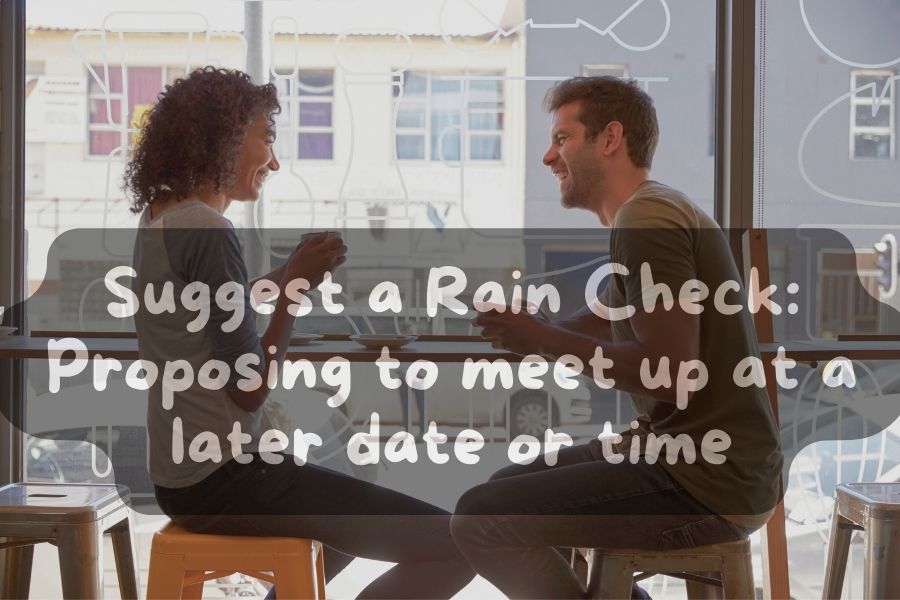
A rain check is like when you want to change plans for a later time because something unexpected came up or you’re busy.
It’s normal to offer a rain check when the original plan can’t happen as planned. When you suggest a rain check, it’s important to say sorry for any inconvenience and show that you really want to meet later.
This shows that you care about the other person’s time and schedule. In a conversation or invitation, you can suggest a rain check by saying you need to change plans because of personal or work stuff, unexpected things, or any good reason.
It’s important to suggest other dates or times that work for both of you so you can still meet later.
By offering a rain check, you’re saying that the original plan is important to you but you’re also flexible and understanding. This way, you can keep a good relationship with the other person.
You might also enjoy: There Once Was a Girl From Nantucket: Fully Explained
8. Show Understanding: Acknowledging the intention behind the pity invite
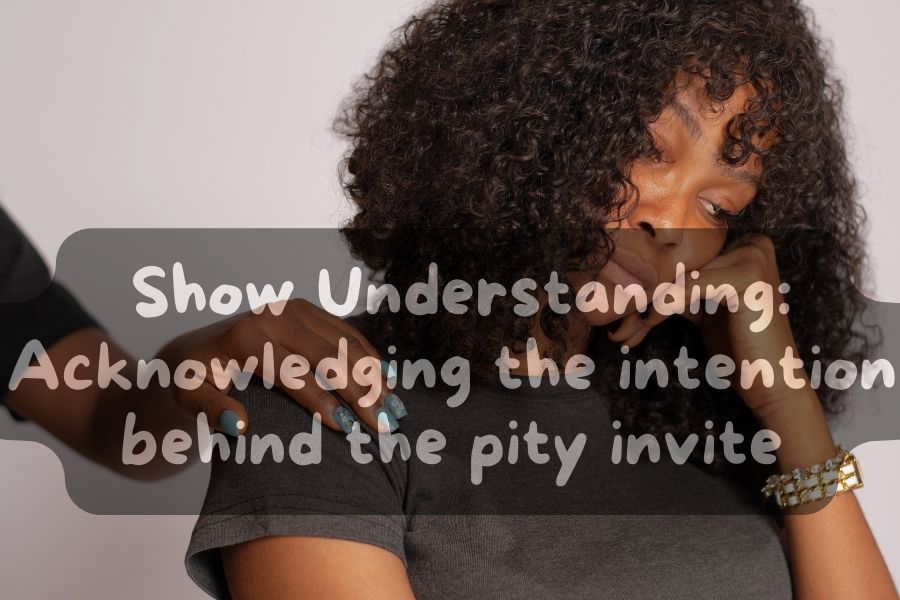
When someone invites you out of pity, it’s important to understand where they’re coming from and show empathy.
A pity invite is when someone feels obligated to include you in something, even if they don’t really want your company.
If you find yourself in this situation, it’s crucial to recognize their underlying intention.
You can do this by thanking them for thinking of you, even if the invitation isn’t what you expected or wanted.
By acknowledging their intention, you show that you understand and empathize with them.
It’s also important to remember that people might give pity invites with good intentions, wanting to include you and make you feel wanted, even if it’s not the best situation for you.
Responding with kindness and appreciation can help maintain a good relationship and prevent any misunderstandings or hurt feelings.
If the invitation doesn’t fit with your plans or interests, it’s perfectly fine to politely decline.
Just make sure to do it in a considerate and understanding way to keep the goodwill between both parties.
9. Offer an Explanation: Providing a brief explanation for declining

When you say no to an invite, it’s good to explain a little bit so the person knows why. You want to be honest and real when you explain.
Just briefly say what’s stopping you from going, like if you’re already busy or have something else going on. It could be personal or work stuff, or anything that makes you not available.
By explaining, you show that you thought about the invite and have good reasons for saying no.
This helps the person understand and not feel let down or confused. But remember, you don’t have to spill all your personal business if you don’t want to.
It’s totally fine to keep it general and not go into too much detail. Just know that explaining is a nice way to keep things positive and make sure everyone gets each other.
You might also enjoy: In The Office or At The Office: 7 Key Differences [2023]
10. Suggest a Different Gathering: Proposing a different event or gathering to attend together

When you gotta suggest a different event or hangout to go to together, you gotta think about the other person’s interests and what they’re into.
Just suggest another gathering and show that you’re down to do something that’s fun for both of you. Start by letting them know you appreciate the invite and that you get where they’re coming from.
Then, throw out an idea for a different event or hangout that you both might be into. Think about what they’re into, what you both like, or any cool stuff that’s coming up that they might wanna check out.
When you suggest an alternative gathering, give them all the deets like the date, time, and where it’s happening.
That’ll make it easier for them to think about it. Also, tell them why you think this other event would be a good time for both of you.
And don’t forget to be open to their ideas too. When you suggest a different gathering, you wanna make it a team effort and make sure both of you feel like you’re a part of the decision.
By suggesting something different, you’re showing that you’re committed to finding something you can do together that’ll make your bond stronger and give you awesome memories.
11. Express Availability: Sharing availability for future plans

When you have future plans, it’s super important to let people know if you’re available or not. You gotta be clear, and concise, and think about the other person’s time and commitments.
First, say that you’re down to participate or go to the event. That shows you’re interested and excited.
Then, give them the deets about when you’re available, like the dates and times. If you have any restrictions on your schedule, let them know.
Being specific helps find a time that works for everyone. If you’re really busy, you can offer some other options or suggest a range of dates that you’re free.
That shows you’re flexible and increases the chances of finding a good time. And make sure to reply quickly when they ask about your availability.
That shows you respect their time and helps with planning. Oh, and don’t forget to be polite and say thanks for the invite or opportunity.
Being clear and considerate when you talk about your availability helps with planning and makes sure everything goes smoothly in the future.
You might also enjoy: Full List Of Words That Start With Bi + Examples [2023]
12. Offer Support: Offering support or assistance in a different way
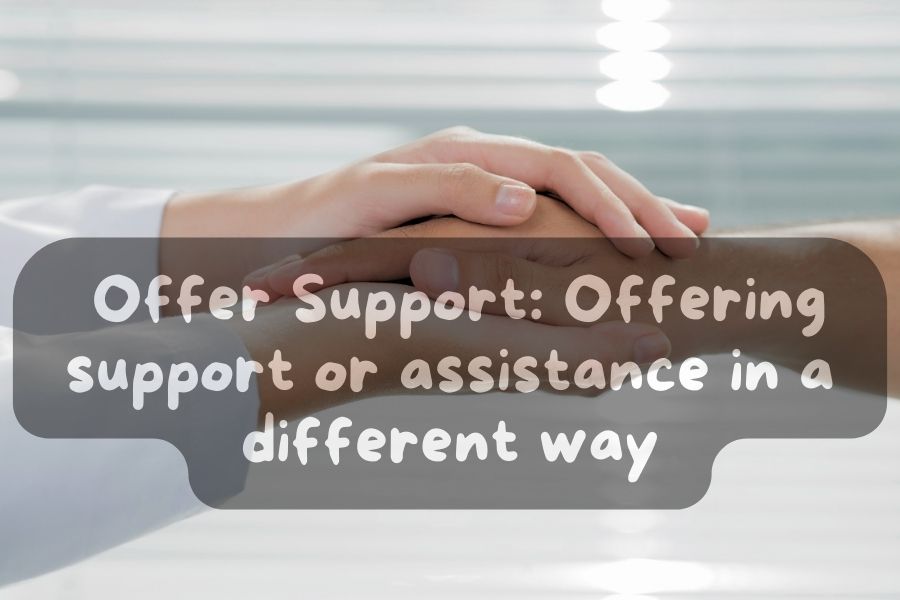
When you can’t help someone in the way they asked, offering a different kind of support can still be useful.
It shows that you’re willing to help and that you’re committed to finding other ways to solve the problem.
If you can’t do exactly what they want, it’s important to show empathy and understanding.
Recognize what they need and then offer a different kind of help that you can actually provide.
You could suggest other resources, give advice, or connect them with someone who can help more.
This shows that you’re serious about finding a solution and that you genuinely want to help.
It’s important to let them know that you’re willing to support them in any way you can, even if it’s not exactly what they asked for.
This approach encourages teamwork and shows that you care about their well-being.
Remember, offering a different kind of support means really listening to them, understanding what they need, and coming up with other solutions that still work.
13. Suggest a Phone Call: Proposing a phone call or virtual meeting instead

When you can’t help someone in the way they want, try a different way. It shows you’re willing to help and you’re trying to find another solution.
If you can’t do what they’re asking, try to understand how they feel and listen to them. Then, offer a different way to help that you can actually do.
You can suggest other places to get help, give advice, or connect them with someone who can help better.
This shows you really want to help and find a solution. It’s important to let them know you’ll help them in any way you can, even if it’s not exactly what they asked for.
This way, you’re working together and showing you care about them. Just remember, listening, understanding their needs, and suggesting other solutions is key to offering support in a different way.
You might also enjoy: Trainer or Trainor: 10 Main Differences + Examples [2023]
14. Express Appreciation for Friendship: Emphasizing the value of the friendship regardless of the invitation

When it comes to friendship, it’s important to show appreciation in a meaningful way. Whether or not you’re invited to events, true friendship goes beyond that.
Instead of focusing on the invitation, it’s better to emphasize the bond and support you share.
By highlighting the value of friendship, you can let your friend know that it’s not just about attending events together.
Show them that you appreciate their presence in your life and the positive impact they’ve made.
This can be done through heartfelt conversations, acts of kindness, or simply spending quality time together.
By expressing your appreciation for the friendship itself, you can strengthen the bond and ensure it remains strong, regardless of any specific invitations that may or may not come your way.
15. Suggest a Group Activity: Proposing a group activity where the focus is not solely on the invitee

When you’re thinking about an activity for a group, it’s important to think about what everyone likes.
You want to choose something that everyone can enjoy and that makes everyone feel included.
One idea is to suggest an activity that has different options so that everyone can do what they like.
For example, you could go on a hike with different trails to choose from or visit a museum with lots of different exhibits.
Another idea is to suggest an activity that involves working together as a team. You could have a game night, or do a volunteer project together.
You could even do a fitness class where everyone can go at their own pace. By suggesting an activity that takes everyone’s interests into account, you make sure that everyone feels included and valued.
Make sure to let everyone know that the goal is to have a good time together and enjoy the activity.
16. Share Personal Limitations: Explaining personal limitations that prevent acceptance
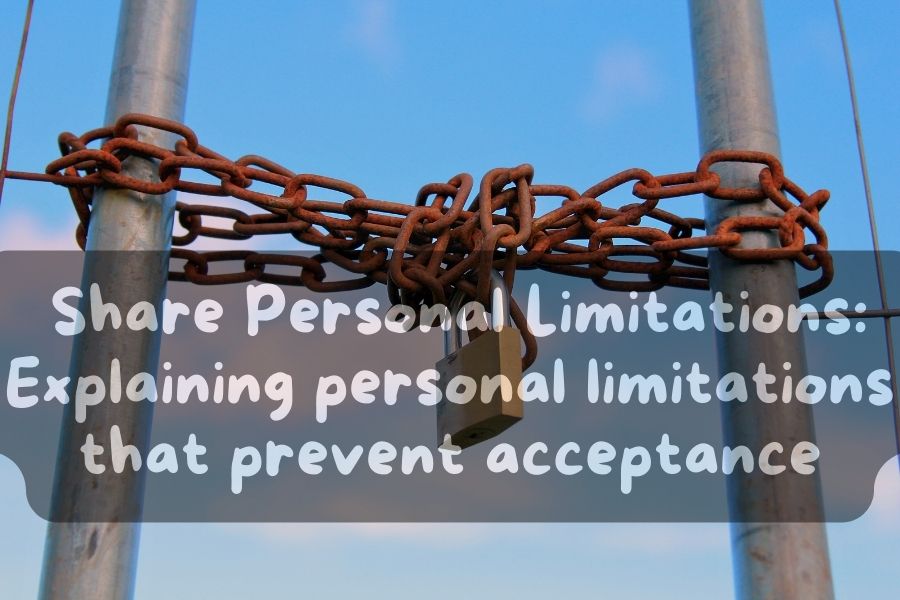 personal limitations when you say no to an invitation is a really honest and respectful way to explain why you can’t go.
personal limitations when you say no to an invitation is a really honest and respectful way to explain why you can’t go.
It’s super important to be clear and to the point about your limitations, while also showing that you appreciate the invite.
When you talk about your personal limitations, it’s crucial to be open and honest about the specific reasons that are stopping you from accepting.
This could be things like having other plans, a busy schedule, not feeling well, not having enough money, or any other valid reasons that make it hard for you to join in.
By sharing your personal limitations, you’re showing that you’re being real and true in your communication.
It helps the other person understand that your decision isn’t about them, but about things that you can’t control.
It’s really important to show that you’re sorry for not being able to accept the invite, and if you can, offer some other ways to connect or be a part of things in the future.
This shows that you care about the relationship and are willing to find other ways to stay connected.
Remember, being open and honest about your limitations helps people understand and keeps the relationship respectful with the person who invited you.
You might also enjoy: Copys or Copies: Differences + Examples [2023]
17. Suggest a Different Venue: Proposing a different location or setting for the gathering
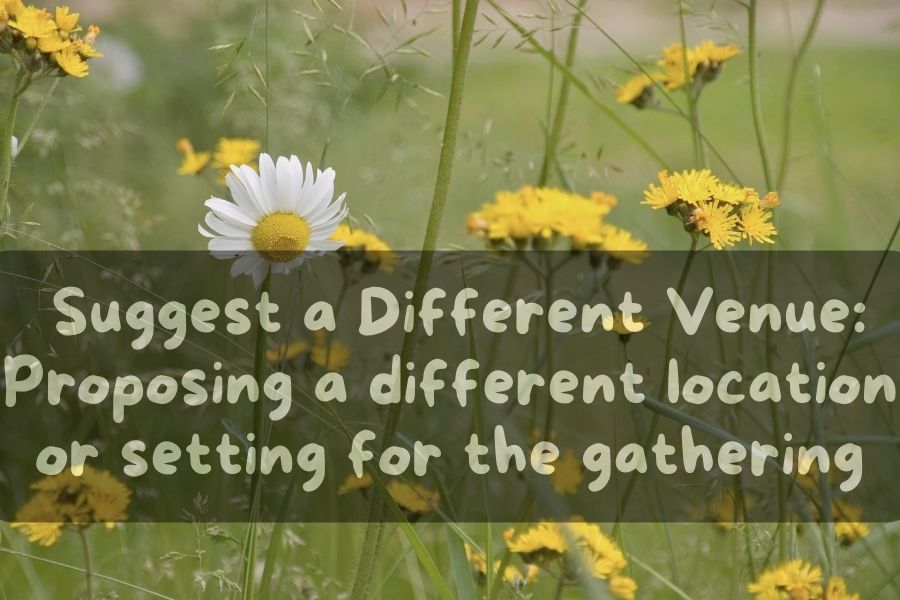
When you’re suggesting a different place for a get-together, it’s super important to handle the situation with tact and think about the original plan.
You can propose a different location in a way that respects everyone’s preferences and needs.
First, say how much you appreciate the first venue choice and acknowledge its good points and any effort that went into picking it.
Then, explain in a simple and clear way why another place might be better. Maybe it’s easier to get to, has more space, a better vibe, or meets specific group requirements.
When you suggest a different spot, it’s helpful to offer specific alternatives that fit the purpose and atmosphere of the gathering.
Think about things like convenience, how close it is, what it offers, and what the attendees would like.
Don’t forget to communicate your suggestion in a respectful and collaborative way, making it clear that you just want to make the experience better for everyone.
By thoughtfully proposing a different place, you’re contributing to the success of the get-together and showing that you’re willing to find a solution that works for everyone.
18. Express Need for Alone Time: Sharing the need for personal space or downtime
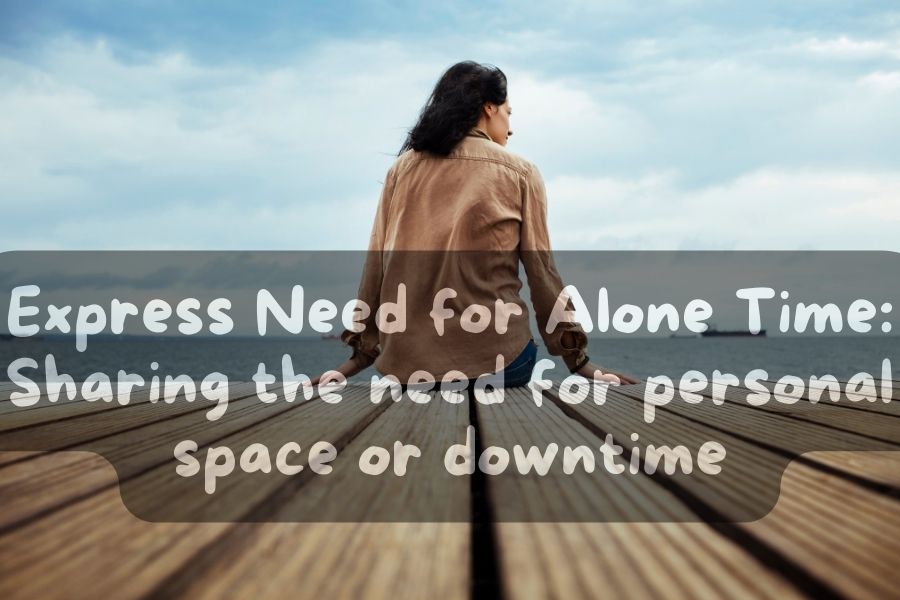
Yo, it’s super important to let people know when you need some alone time. Having personal space and downtime is crucial for recharging, reflecting, and taking care of yourself.
When you’re talking about needing alone time, make sure you’re clear and respectful. Start by thanking the person for understanding and supporting you.
Then, let them know that you need some time alone to relax, recharge, or do things that make you happy.
Make it clear that it’s not about how you feel about them, but it’s just something you gotta do for yourself. It’s also helpful to give them an idea of when you’ll be back or available.
And don’t forget to reassure them that you value your relationship and that this alone time will actually make your time together even better.
By being clear and considerate when you talk about needing alone time, you can build understanding and respect in your relationships and take care of yourself at the same time.
19. Suggest a Different Date: Proposing a different date that works better for both parties
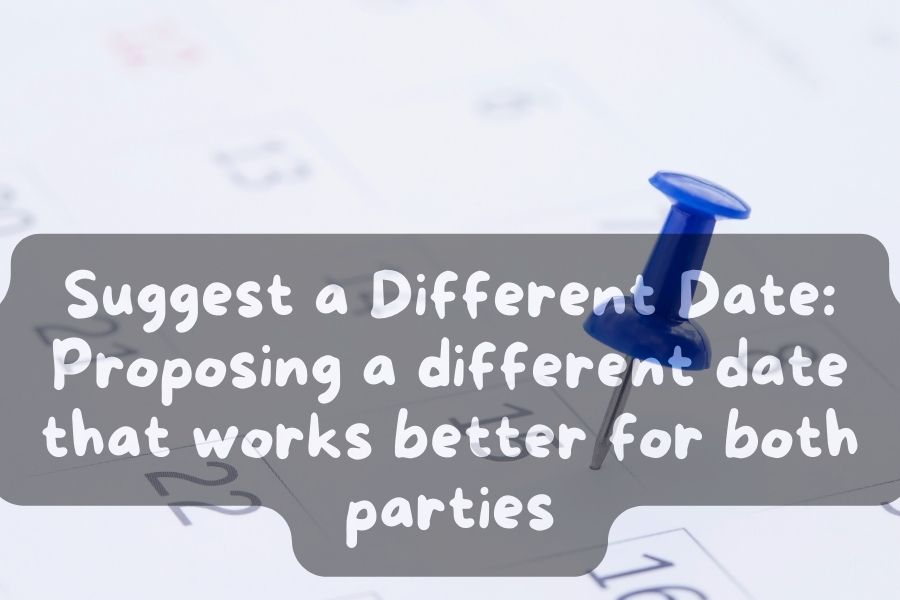
it’s so important to let people know when you need some alone time. Like, having personal space and downtime is super crucial for taking care of your mental and emotional well-being.
When you talk to someone about needing alone time, just be clear and respectful about it. Start off by showing appreciation for the person’s understanding and support.
Then, just explain that you need some time to yourself to chill, recharge, or do stuff that makes you happy and peaceful.
Make sure they know that it’s not about how you feel about them, but more about taking care of yourself.
It helps to give them a heads up on when you’ll be taking this alone time, so they know when you’ll be back or available.
And also, let them know that you value your relationship and that this alone time will actually benefit both of you by making you more present and engaged when you hang out.
By communicating your need for alone time in a clear and considerate way, you can build understanding and respect in your relationships while also prioritizing your own well-being.
You might also enjoy: Boys’ or Boy’s– Which One is Correct? + Example
20. Express Openness for Future Invitations: Expressing openness to future invitations and maintaining the connection

When someone invites you to something, even if you can’t make it right now, it’s important to let them know you’re still open to future invites.
Show gratitude for the current invite and say you’re sorry for not being able to go. You can also mention that you’d be interested in similar events in the future.
This shows that you really want to keep the connection and be considered for other opportunities.
By being open, you’re showing that you appreciate being included and that you want to keep getting invites.
To keep the connection going, suggest other ways to stay in touch or say you’d like to hang out outside of the specific event.
This keeps the communication going and shows that you’re interested in a positive relationship.
Overall, being open to future invites and keeping the connection shows that you’re willing to engage and be a part of future events, which helps the relationship grow and thrive.
Conclusion
To wrap things up, when you receive a pity invite, it’s important to approach it with sensitivity, understanding, and thoughtfulness. These moments can be tricky, but they also present a chance to showcase your social skills and emotional awareness.
When you find yourself in this situation, keep in mind that the person extending the invitation likely has good intentions, even if it doesn’t align with your desires or expectations.
They may simply want to include you out of kindness or to ensure you feel included. Acknowledging their positive intentions can guide you in responding in a way that nurtures the relationship and appreciates their thoughtfulness.
By replying sincerely and with gratitude, you can convey that you recognize the kindness behind the invitation while also clarifying your needs and boundaries.
A heartfelt thank you can significantly acknowledge their effort. For example, you could say, “I truly appreciate you thinking of me and inviting me.”
This creates a warm atmosphere and shows that you value their gesture.
Regardless of whether you choose to accept the invitation, propose an alternative plan, or graciously decline, the key is to do so respectfully and with understanding. If you opt to attend, be sure to immerse yourself in the experience and enjoy it. If you decide to pass, consider suggesting a different time or place that suits you better, like saying, “I can’t make it to the event, but I’d love to grab coffee next week.”
Always keep communication open, express your thanks for their thoughtfulness, and be honest about your availability and preferences.
Clear communication helps avoid misunderstandings and ensures that both sides feel valued.
If you need to say no, do so with honesty and kindness, perhaps saying, “Thank you for the invite, but I have other plans that day. Let’s set something up soon.”
By doing this, you can foster positive relationships and steer clear of misunderstandings or hurt feelings. It’s essential to be mindful of the other person’s emotions while also honoring your own needs and boundaries.
Striking a balance between these elements can help you navigate social situations with ease and maintain healthy connections.
In the end, responding to a pity invite offers a valuable opportunity to practice empathy and understanding, leading to respectful interactions with others.
It’s a chance to demonstrate that you appreciate the relationship and are committed to engaging in a way that considers both parties’ feelings. This can enhance your bonds and build trust.
When you tackle these situations with kindness and thoughtfulness, you’ll manage them smoothly and keep those positive connections alive with those around you.
Each interaction serves as a chance to strengthen relationships and showcase your ability to communicate with empathy and effectiveness.
By doing this, you help create a more supportive and understanding social atmosphere.
To sum it up, addressing a pity invite with sensitivity and empathy not only helps preserve positive relationships but also showcases your skill in navigating social dynamics gracefully.
By being sincere, grateful, and clear in your communication, you can ensure that both you and the inviter feel respected and valued. This approach nurtures healthy interactions and deepens your connections with others.

Hi, welcome to my blog! My name is Omid and I am thrilled to have you here! I am an English language teacher with 12 years of experience and hold multiple international certifications (TESOL, IELTS, TOEFL, PTE, CELTA). Additionally, I hold a PhD in Applied Linguistics with a specialization in Teaching English as a Second Language (TESL), which fuels my passion for teaching English and assisting others in mastering the language. To me, nothing is more rewarding than helping individuals enhance their English language abilities through various methods. So, let’s embark on this journey of learning English together.




